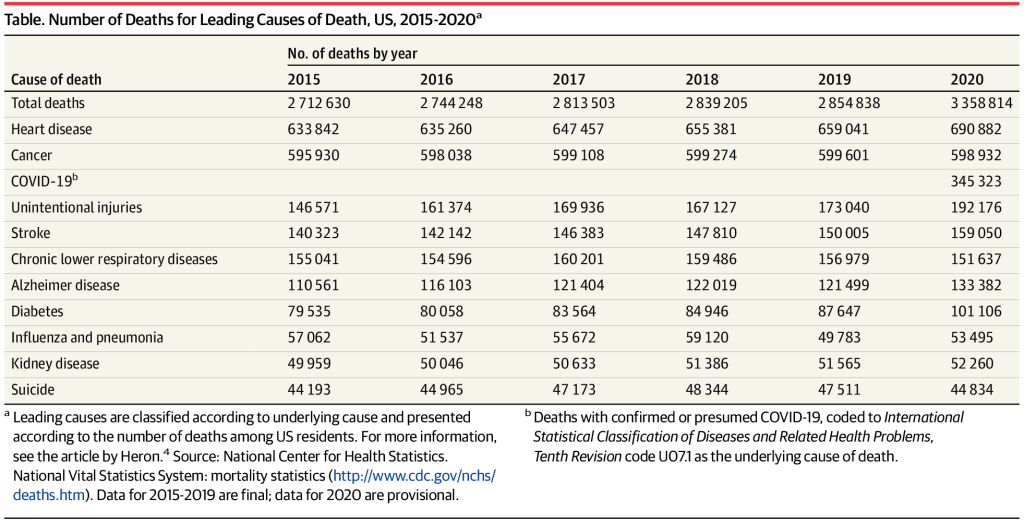17 April 2021 — Swiss Policy Research
Overall, ‘lockdowns’ have had no discernible impact on covid mortality. This is true in the US (compare Florida to other states) and in Europe (compare Sweden to the EU), but also in Latin America (compare Peru and Argentina to Brazil), Africa (low impact of covid anyway), and even in Asia (see India, Bangladesh, Indonesia and the Philippines).
 USA: Leading causes of death, 2015 to 2020 (JAMA, March 2021)
USA: Leading causes of death, 2015 to 2020 (JAMA, March 2021)
The only two exceptions to this rule are extreme lockdowns in China and preemptive lockdowns in support of early border controls, which succeeded primarily on some islands and possibly in Indochina (Vietnam, Thailand, Laos, Cambodia), Norway and Finland. Note that New Zealand and some other islands had already avoided the 1957 and 1968 flu pandemics. Some of the most successful islands never even had a Western-style lockdown (e.g. Taiwan and Japan).
In contrast, lockdowns have caused unprecedented social and economic devastation, destroying hundreds of millions of livelihoods worldwide, according to official estimates. In sub-Saharan Africa, the increase in deaths from malaria and tuberculosis each exceeds the total number of covid deaths. Interestingly, if one considers both GDP loss and new public debt, New Zealand is one of the worst affected countries in the world.
Nevertheless, some proponents of lockdowns argue that lockdowns have at least not led to an increase in suicides. They point to a recent US study, published in JAMA, apparently showing a decrease in US suicides in 2020 by 2,700, from 47,500 to 44,800.
But the reality is far different: First, US CDC data shows that 6,900 cases of “intentional or unintentional injuries”, which include suicides, were classified as “covid deaths” (deaths with covid). But more importantly, suicides in the US cover only a fraction of ‘deaths of despair’: the very same JAMA study shows that “unintentional injuries”, “largely driven by drug overdose deaths”, increased by an unprecedented 19,000 to a sad record of 192,000. And if the economic and labor market situation doesn’t recover quickly, this may have been only the beginning.
This calculation doesn’t even include the dramatic increases in severe depression and attempted suicides, especially in children and young adults, the groups least affected by covid. Thus, there is simply no denying it: reactive lockdowns were a serious policy mistake.